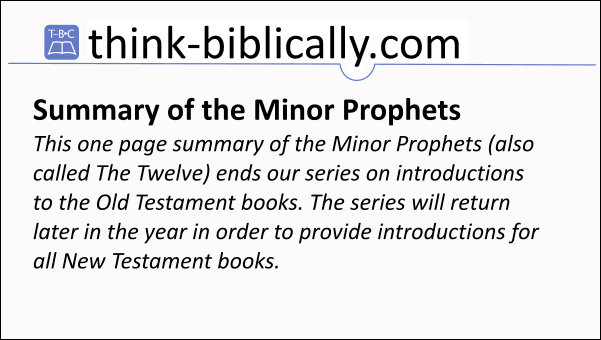By Tyson Thorne

Overview of the Twelve Minor Prophets
This one page summary of the Minor Prophets (also called The Twelve) ends our series on introductions to the Old Testament books. We sincerely hope this has been fruitful for all our readers and helped them improve their knowledge of the Bible and provided a resource everyone can return to when studying a particular book of the Bible. We will be updating these pages as new information becomes available so be sure to check back for the very latest content. The series will return later in the year in order to provide introductions for all New Testament books.
Hosea (Date of composition: 790-715 bc, to Judah)
A contemporary of Isaiah and Micah. Big Idea: the apostasy of Israel, characterized as spiritual infidelity. Striking metaphors are used to depict the people’s sins.
Joel (Date of composition: 830-ish bc, to Judah)
A prophet of Judah. Big Idea: only Israel’s national repentance can turn “the Day of the Lord” into a time of blessing.
Amos (Date of composition: 760-ish bc, to Israel)
It wasn’t just King David who was prepared for the Lord’s service by tending sheep. Amos, also a shepherd, lead a spiritual reformation, denouncing selfishness and sin. The book is organized around five central visions.
Obadiah (Date of composition: 848-841 bc, to Israel)
Big idea: the judgment and destruction of Edom and the deliverance of Israel.
Jonah (Date of composition: 793-753 bc, to Israel)
Infamously known as “the reluctant prophet,” Jonah will never be forgotten for his all-too-common attitude toward following the Lord.
Micah (Date of composition: 735-800 bc, to Judah)
Big idea: despite the dark moral decay of Israel, there will be a Messianic kingdom in which righteousness prevails.
Nahum (Date of composition: 697-642 bc, to Judah)
Like Jonah, the theme of Nahum is the destruction of Ninevah, and Israel’s deliverance from Assyria.
Habakkuk (Date of composition: 606-604 bc, to Judah)
Big idea: the justice of God. Habakkuk undertakes one of histories most difficult questions, namely, “how can a just God allow evil and injustice?”
Zephaniah (Date of composition: 622-612 bc, to Judah)
Mostly a threatening theme, but ending with the future glory of God’s coming kingdom.
Haggai (Date of composition: 520 bc, to exiled Israel)
Zechariah’s contemporary, mainly concerned with the rebuilding of God’s temple and His glorious return.
Zechariah (Date of composition: 520-ish bc, to exiled Israel)
Centered around the same central theme of Haggai, his book is organized around eight visions.
Malachi (Date of composition: 450-430 bc, to post-exilic kingdom)
Big idea: the reform of the nation for the coming of the Messiah. Malachi paints a dark portrait of the close of Old Testament history.
